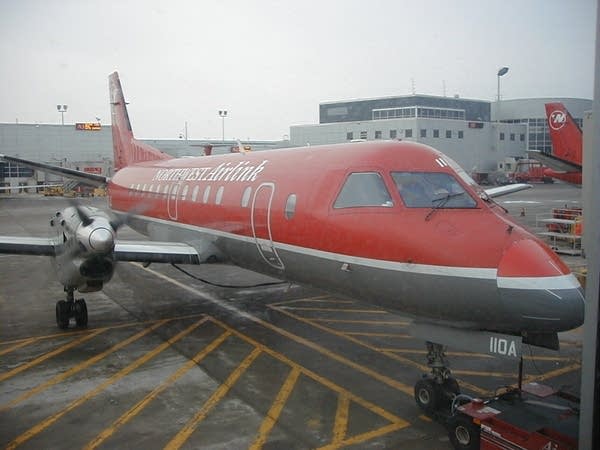Mesaba unions fight proposed pay cuts

The financial turmoil in the airline industry is trickling down to small carriers like Mesaba. Flying under the Northwest Airlink name, Mesaba ferries passengers between Northwest hubs around the upper Midwest. For many Minnesota communities, Mesaba provides the only commercial link to the nation's air transportation system.
Mesaba ran into cash shortages after Northwest Airlines filed for bankruptcy in September. Northwest withheld some $30 million it owed Mesaba for flying the carrier did last summer. Mesaba spokeswoman Elizabeth Costello says the company is dependent on the business it gets from Northwest.
"We work with Northwest Airlines and Northwest dictates our flight schedule, it dictates what type of aircraft we fly," said Costello. "They're slashing our fleet in half, so for this company to survive, we have to have certain cost reductions across the board or else we will not survive."
Prior to the Northwest Airlines bankruptcy, Mesaba had a fleet of 100 aircraft. Northwest is reducing that number to 49 planes. Officials with Northwest declined to be interviewed for this story.
Create a More Connected Minnesota
MPR News is your trusted resource for the news you need. With your support, MPR News brings accessible, courageous journalism and authentic conversation to everyone - free of paywalls and barriers. Your gift makes a difference.
Costello says for Mesaba to remain viable, it needs to cut wages and benefits by nearly 20 percent over the next six years. She says the cuts would affect all employees, from executives and managers to union and non-union workers.
Pilots union officials say those cuts would be devastating, especially to junior pilots. Right now, starting pay for a first-year pilot is only $21,500 a year. The proposed cut would bring that down to $17,500. And union leaders say when you factor in proposed increases in health care premiums, the take-home pay for a first-year pilot would drop to less than $14,000 a year.
If they maintain their current position of 19.4 (percent) for six years... then we are heading straight towards mutual destruction.
The financial fate of the airline and its more than 1,400 union workers lies with a federal bankruptcy judge in Minneapolis. Mesaba has asked the judge for permission to cancel its union contracts and impose its terms on the pilots, mechanics and flight attendants unions. Judge Gregory Kishel is expected to make a decision May 11. All sides agree there's a lot at stake.
"Obviously, there's apprehension on both sides as to which way the judge might rule," said Kevin Wildermuth, a negotiator for the mechanics union.
Wildermuth says despite months of negotiations with Mesaba, the company's target for wage cuts hasn't budged.
"If they maintain their current position of 19.4 (percent) for six years and are unwilling to move from that position, then we are heading... straight towards mutual destruction," he said.
Wildermuth says since the bankruptcy, about 10 percent of Mesaba airline mechanics have quit over fears of wage cuts. He says the proposed cuts would make Mesaba airline workers the lowest paid in the industry.
Union officials say Mesaba's only viable path out of bankruptcy is to reach a consensual agreement with each of its unions. Chris Collins is a pilot and a union representative. Collins says without a fair agreement, Mesaba will collapse, either through a multi-union strike, or through a mass exodus of skilled workers.
"A lot of people are saying we've had enough," Collins said. "There's no way we're going to be able to work for these wages. With just the threat of this looming over our heads people are starting to leave. Imagine if they were implemented. I would see people leaving in droves."
A strike would shut down almost all commercial air service in the eight greater Minnesota communities Mesaba serves. But company spokeswoman Elizabeth Costello says Mesaba believes a strike isn't allowed under bankruptcy laws.
"We don't believe a strike is legal in these circumstances and we would file an injunction," Costello said. "We do not believe a strike is legal while the company is in bankruptcy."
City officials in communities served by Mesaba are closely watching the ongoing dispute between the carrier and its unions. Many say a loss of commercial airline service would be devastating to the economies of those towns.
